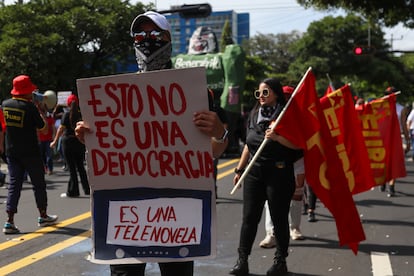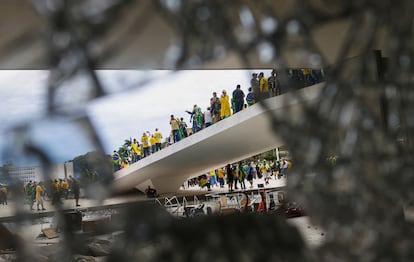Democracies are facing a crisis of electoral legitimacy
One in five elections was challenged between 2020 and 2024, according to the latest report from the intergovernmental institute IDEA


On December 2, 2020, then-president Donald Trump appeared before Americans to denounce the “massive and widespread fraud” that had robbed him of his re-election. On July 18, 2022, just a year and a half later, the far-right politician Jair Bolsonaro questioned Brazil’s electronic voting system, with less than three months before the elections in which Luiz Inácio Lula da Silva emerged victorious. In both cases, the unfounded accusations ended with physical assaults on the seats of public power and, in Bolsonaro’s case, with his political disqualification. These are not isolated incidents. On the contrary, questions about electoral legitimacy seem to be increasingly frequent around the world, according to a report called “The Global State of Democracy 2024,” published by the Stockholm-based International Institute for Democracy and Electoral Assistance (IDEA).
The “disease of electoral denialism” has become a global phenomenon, said Kevin Casas Zamora, the secretary general of IDEA, in the wake of the publication’s release on Tuesday. Between May 2020 and April 2024, one in five elections was challenged — there were 221 national ones in 159 countries — which includes boycotts by opposition parties, the refusal of losing candidates to accept the results, legal challenges in court, violence with civilian deaths and riots. Allegations of fraud have been made in places as far away from one another as Peru, Myanmar and Israel. These accusations, the report underlines, “combine to challenge public confidence in political processes.”
The data is overwhelming. Over the past 15 years, the global rate of electoral participation has declined by ten percentage points from 65.2% to 55.5%. And while in 1975 the percentage of elections that were followed by protests was 3.8%, today it is 27.6%. In the 135-page document, the intergovernmental organization states that this is “an era of radical uncertainty,” in the midst of which, to keep democracy alive it is necessary to “preserve public confidence in electoral avenues for political change.”

The causes
Casas Zamora says that this loss of confidence is a multi-causal phenomenon that can be explained by at least four reasons. On the one hand, the growth of inequality and corruption. In his opinion, democracies have great problems protecting equity, while corruption scandals feed the notion that political systems work to protect the interests of increasingly smaller groups. For the former vice president of Costa Rica (2006-2007), “the way capitalism has been functioning in the last four decades has had very visible consequences for democracy.”
On the other hand, there are the difficulties of democracy in managing rapid social change. In Casas Zamora’s opinion, technological and environmental changes—the report also talks about migration, armed conflicts and the development of artificial intelligence—produce a “high level of anxiety,” in which society embraces authoritarian figures who promise a restoration of order. Finally, democracies face a hostile environment in which the consequences that an authoritarian regime pays on the international stage are not as forceful as they were just a generation ago. “When you add those four things together, the effect is toxic,” he says.
This effect is reflected, for example, in the very high levels of political polarization, which is growing hand in hand with social networks. “We need to have a serious conversation about their regulation, which cannot be left to the discretion of private platforms,” he asserts. The adherence of young people to democracy “has also been greatly weakened.” The secretary of IDEA highlights that this population tends to participate around very specific causes that mobilize them, where they do not have to reach a compromise with others, as those who participate in traditional political spaces must do. Any social progress, Casas insists, implies compromising, but this is conceived by a large part of young people as a betrayal.

The report
Democracy continued its decline in 2023. Last year, 82 countries regressed in their democratic performance, while only 52 advanced. In total, the report analyzed the situation in 173 countries. According to IDEA, 2023 was the worst year they have seen in terms of political representation, especially due to the levels of uncertainty regarding norms, practices, standards of conduct and acceptance of legitimate results in elections. Disinformation, threats of foreign interference and possible uses of generative AI in campaigns are some of the challenges for representative democracy.
In terms of fundamental rights, the organization assessed factors such as the existence of a fair legal system and respect for civil liberties. According to the report, compared to 2018 data, people’s rights have been restricted, especially in terms of economic equality and freedom of expression (in 22% of the countries analysed). In contrast, the most common progress was in freedom of expression, which improved in 17 of the 173 countries examined.
The report also states that more countries have experienced declines than progress when it comes to the rule of law. For IDEA, a relevant element for the analysis of this category is the role of the courts, since the factors that have suffered the most are judicial independence and the predictable application of the law. In contrast, the only area of democratic practice that has not been affected by the negative trend is citizen participation.
Grouped by region, here are some relevant data on the state of democracy in the world at the end of 2023, according to the intergovernmental organization IDEA:
Latin America and the Caribbean
The indicators are of particular concern in El Salvador, where President Nayib Bukele has “has systematically derailed democratic checks on power by weakening term limits, starving the opposition of funding, intimidating the press and instituting a state of emergency that has allowed him to severely restrict human rights.” In Ecuador, “growing public insecurity has also been met with harsh state responses.” Haiti was the country with the most pronounced decline in its democratic performance in the region.
In relation to the rule of law, the report highlights that sometimes the courts are co-opted to support certain candidates or guarantee certain electoral results. As examples, it cites Guatemala, where the measures taken by prosecutors to strip President Bernardo Arévalo of his immunity were seen as an attempted coup d’état, or Peru, mired in a political crisis following the self-coup of President Pedro Castillo and the rise to power of Dina Boluarte in 2022. In terms of gender equality, it highlights the election of Claudia Sheinbaum as the first female president of Mexico as positive.
USA and Canada
The report highlights that no election is receiving as much international attention as the one in the United States, which this November will finally choose between Donald Trump and Kamala Harris. The country “experienced a period of democratic contraction” between 2017 and 2021, during the first term of Donald Trump, both due to the actions taken in the executive branch and the performance of Congress. Afterwards, the country has improved in indicators in terms of absence of corruption and access to justice, but other indicators, such as the credibility of elections, civil liberties and political equality, have not recovered in a scenario of strong polarization.
This is evidenced by the fact that at least 1 in 10 Americans are “open to the use of political violence.” Similarly, a recent IDEA poll found that “less than half of Americans agreed that the 2020 election [won by Joe Biden and challenged by Trump] was free and fair.”
In Canada, the report highlights the country’s decline in economic equality, as the wealth gap between high- and low-income households widened at the fastest pace in history in the first quarter of 2023.
Europe
In Europe, 44% of countries declined in at least one factor of democratic performance. In particular, 11 countries retreated in terms of ensuring access to justice, and seven did so in indicators related to the credibility of elections. The country in the region that retreated the most was Belarus, where Aleksandr Lukashenko has crushed the opposition and rules with an iron fist. The report also highlights how the push for certain countries to join the European Union as a result of Russia’s war in Ukraine has translated into advances in access to justice, economic equality and freedom of expression, in countries such as Albania, Kosovo and Moldova.
IDEA stresses that the far right made significant gains in several countries in the European elections, and that this outcome raises questions related to the future direction of support for democracy across the continent. Nevertheless, the report stresses that the elections remain promising as a means of facilitating the peaceful transfer of power between political parties and ideologies. It cites as an example Poland, where the 2023 elections marked the departure from power of the ultra-conservative Law and Justice (PiS).
Africa
56% of African countries have regressed on at least one indicator of democratic quality. The report highlights the serious impact of coups on the continent, especially in terms of political representation and the guarantee of fundamental rights. The bloody war in Sudan, where at least 10.4 million people have fled within or outside the country, is one of the conflicts that “have had an immense human cost.”
The organization highlights “small signs of change that offer hope,” such as the appointment of Judith Suminwa as the first female head of government in the Democratic Republic of Congo, or the possibility that Namibia may elect a woman president in the November elections. It also considers positive the emergence of a new generation of political leaders in countries such as Mozambique and Senegal.
Asia and Pacific region
The region has seen declines in terms of political representation and guarantees of fundamental rights in several of the countries that held elections this year. These include India, Indonesia, Pakistan, South Korea and Sri Lanka. The report highlights that elites have taken measures to restrict opposition parties and limit transparency in order to tilt the playing field in many countries in the region. Asia and the Pacific is, along with Africa, the region that has declined the most in democratic performance indicators (51% of countries).
In Myanmar, for example, “the authorities have restricted the right of journalists to operate freely” as well as the right of people to assemble. Afghanistan is one of the countries with the sharpest decline in indicators, on issues such as fundamental rights, especially those of women, economic equality, freedom of parties or parliamentary control. The arrival of the Taliban to power completely deprived the country of a functioning parliament, notes the report.
Sign up for our weekly newsletter to get more English-language news coverage from EL PAÍS USA Edition
Tu suscripción se está usando en otro dispositivo
¿Quieres añadir otro usuario a tu suscripción?
Si continúas leyendo en este dispositivo, no se podrá leer en el otro.
FlechaTu suscripción se está usando en otro dispositivo y solo puedes acceder a EL PAÍS desde un dispositivo a la vez.
Si quieres compartir tu cuenta, cambia tu suscripción a la modalidad Premium, así podrás añadir otro usuario. Cada uno accederá con su propia cuenta de email, lo que os permitirá personalizar vuestra experiencia en EL PAÍS.
¿Tienes una suscripción de empresa? Accede aquí para contratar más cuentas.
En el caso de no saber quién está usando tu cuenta, te recomendamos cambiar tu contraseña aquí.
Si decides continuar compartiendo tu cuenta, este mensaje se mostrará en tu dispositivo y en el de la otra persona que está usando tu cuenta de forma indefinida, afectando a tu experiencia de lectura. Puedes consultar aquí los términos y condiciones de la suscripción digital.








































